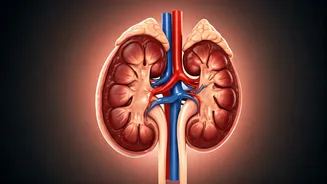What Your Kidneys Do
Kidneys serve as the body's primary filtration system, working tirelessly to remove waste products and excess fluids from the bloodstream. Beyond filtering,
these bean-shaped organs meticulously balance electrolytes, regulate blood pressure, and activate vitamin D, which supports bone health. Moreover, they produce hormones like erythropoietin, essential for red blood cell production. Their crucial role in maintaining overall health underscores the importance of proactive kidney care.
Stay Hydrated, Always
Adequate water intake is fundamentally crucial for maintaining kidney health. Water helps the kidneys efficiently filter waste and toxins, preventing the build-up of harmful substances. It is generally recommended to drink enough water throughout the day to keep urine clear and pale. Dehydration can increase the risk of kidney stones and impair kidney function, highlighting the importance of consistent hydration to support overall kidney function and health.
Healthy Diet Choices
Adopting a balanced diet plays a significant role in preserving kidney health. Limiting processed foods, which are often high in sodium, phosphorus, and potassium, is key. High sodium intake can elevate blood pressure, putting extra strain on the kidneys. Choosing fresh fruits, vegetables, and lean proteins, and carefully controlling portion sizes can help prevent kidney issues. A diet rich in nutrients can help maintain kidney function and reduce the risk of kidney-related diseases.
Monitor Blood Pressure
High blood pressure is a leading cause of kidney damage. Regular monitoring of blood pressure is crucial. If blood pressure remains consistently elevated, it can cause the kidney’s blood vessels to narrow and weaken, leading to potential damage. Effective blood pressure control through lifestyle changes, such as a balanced diet, regular exercise, and stress management, is vital. Medication, when prescribed by a doctor, also plays a crucial role in maintaining healthy blood pressure levels to protect the kidneys.
Manage Blood Sugar
Diabetes significantly impacts kidney health, making diligent blood sugar management essential. High blood sugar levels can damage the blood vessels in the kidneys, leading to kidney disease. Regular blood sugar monitoring and lifestyle adjustments, including diet and exercise, are crucial for people with diabetes. Working closely with a healthcare provider to manage blood sugar through medication and healthy lifestyle habits is also important to prevent or delay the onset of kidney disease.
Avoid Overuse of Pills
Certain medications, especially over-the-counter pain relievers such as nonsteroidal anti-inflammatory drugs (NSAIDs), can harm the kidneys if used excessively or over a long duration. These drugs can reduce blood flow to the kidneys, potentially causing damage. It is important to adhere to recommended dosages and consult with a doctor before taking any medication regularly. Being mindful of the potential risks associated with prolonged use of certain medications is a key step in protecting kidney health.













